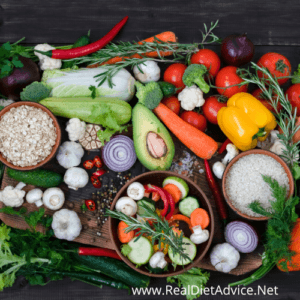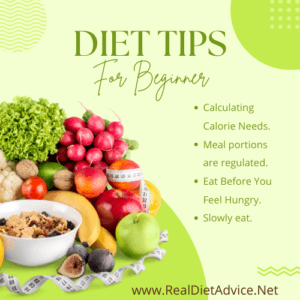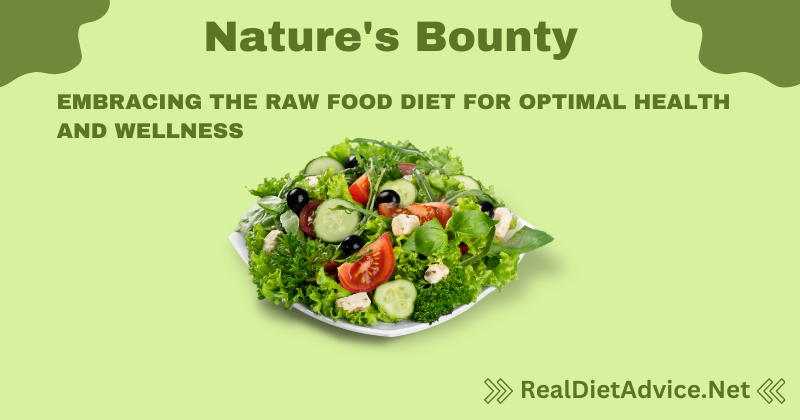If you want to ensure that you can remain fit, healthy and strong, you’ll need to find the right diet plan for you. You can probably achieve this through the raw food diet.
Raw food has many benefits. You should embrace the raw food diet in a way that is most beneficial to you.
This article will give you plenty of information to help you get the most out of this diet. You will be able to improve your fitness and health by following this diet.
You will experience a variety of life-changing benefits when you take control of your life and health.

What is a diet of raw foods?
The diet is based on eating uncooked foods, usually in the form or fruits and vegetables. You will be able to absorb all the nutrients associated with these foods if you eat them raw. Cooked foods lose a great deal of their nutritional value. You can absorb the nutrients from these foods by eating them raw.
A rise in highly-processed foods has led to many people adopting such diets. The process not only destroys the traditional value of food, but also does more harm to the body than good. Processed food is often laced with high fructose-corn syrup, sodium, and other chemicals and preservatives which have no place in the body. You will be able to tell exactly how the food was prepared, and you’ll retain many of the benefits you expect.
Does Raw Food Diet Work?
Raw foodism and raw veganism are terms used to describe a diet that consists of eating primarily whole, unprocessed foods, preferably organic, which have not been heated beyond 104-118degF. Raw food advocates believe that cooking foods above these temperatures destroys their natural enzymes and nutrients, which is harmful because enzymes help digestion and fight chronic diseases. Raw food diets are effective for weight loss because they tend to be low in calories and high in fiber. They also use whole, healthy foods. Fruits, vegetables, seeds, and nuts are all included in the diet, which can help you increase your intakes of fiber, vitamins, minerals and antioxidants.
The raw food diet has its critics. This is a very restrictive diet that can cause nutrient deficiencies, such as vitamin B12 and iron. Cooking does destroy some nutrients but also makes them more digestible. Raw food diets are also difficult to follow for a long time due to the restrictive nature of the diet and its social implications. The raw food diet is not for everyone. While it may be effective for some, potential adopters must carefully weigh the health risks and implications before beginning.

Health Benefits Raw Food Diet
Raw food diets, which emphasize the consumption of unprocessed, uncooked, plant-based foods can have several health benefits. The high fiber content in the diet can help with digestion, weight management and blood sugar control. Fiber-rich foods make you feel satiated for longer and can help reduce your calorie intake. The raw food diet also contains a lot of fruits and vegetables that are rich in phytonutrients and antioxidants. These compounds are linked to a lower risk of chronic illnesses such as diabetes, heart disease and certain types of cancer. Diets are typically low in sodium, and high in potassium. This may help to maintain healthy blood pressure.
Raw food diets can also be beneficial because they emphasize whole, unprocessed food. The modern diet is full of processed foods that are high in sugar, sodium, and unhealthy fats. These can cause a number of health problems, such as heart disease, obesity and high blood pressure. This diet, which focuses on raw food, can help avoid potential pitfalls. Raw foods contain more vitamins and minerals than their cooked counterparts. However, cooking can increase the bioavailability.
It’s also important to weigh the downsides and benefits of a diet rich in raw foods. This diet is restrictive and difficult to follow. It can lead to nutrient deficiencies. If you’re considering a raw-food diet, consult a doctor or nutritionist to make sure that you are getting the nutrients necessary. Balance and variety, as with any diet are essential to achieve and maintain optimal health.
Raw Foods Diet Menu
Raw foods are uncooked, unprocessed and organic foods. Menus can vary widely depending on the person’s preferences, dietary requirements, and form of raw foodsism. However, there are certain common foods that people tend to include.
Breakfast might consist of fresh fruit, or a smoothie with bananas, berries and raw nutmilk, along with some raw nuts or seeds to add protein. Lunch might be a salad with sprouts and avocados as well as tomatoes, peppers and other raw vegetables. The dressing could be made with blended raw cashews and herbs, or a mixture of lemon juice and raw cashews. Raw vegetables, raw hummus or fresh fruits are all good snacks. Raw foodists might serve zucchini noodles (zoodles) with a pesto made of fresh herbs, garlic and lemon juice.
Raw food diets allow for desserts and treats. A raw cheesecake, for example, can be made with a crust of dates and nuts and a filling that is cashews blended with sweeteners such as agave nectar and fresh fruit. Fresh juices, herbal teas, and smoothies are all good options for drinks. With a little creativity and planning it’s possible to create an interesting and tasty menu. It’s important to remember that a diet rich in raw foods may not contain all the necessary nutrients. For example, vitamin B12 or certain proteins.
Juicing
Juicing is a great way to get the nutrition you need. You will gain many benefits by incorporating juices in your diet. You will get into the habit of consuming fresh fruits and veggies instead of always sticking to a meat-based meal. You will get more fruits and vegetables by juicing. You can absorb more of the nutrients you need to stay healthy and live a long life.
Smoothies
Juicing can be a disadvantage because you lose some of the fibers that come with fruits and vegetables. Smoothies allow you to include more vegetables in your diet, while still maintaining the fiber you need to boost your energy levels and have a healthy digestive system. Many people who like to drink juices add vegetables such as kale to smoothies to obtain nutrients that are otherwise difficult to extract or absorb.
Organic
If you are going to follow one of these diets then the best option is to buy organic produce. You will be consuming fruits and veggies that are free from many chemicals, hormones, and pesticides. You can get a lot of nutrition without the side effects. This is the best way to adopt a new diet, and you will get the most out of it.
With this in mind you can understand why a diet like that would be beneficial for you. Consider looking into this diet today if you think it is something that would be beneficial to you. You will only need to plan your grocery trips more carefully and you can enjoy the benefits of this diet.
You can reach out to dietitians and other professionals to get the help you need. They will help you make the right choices and provide you with information to move forward.
Conclusion
A raw food diet involves eating unprocessed, organic food without cooking or processing, and may bring many health advantages and challenges. Diets with plenty of fiber and an emphasis on fruits and vegetables can help improve digestion while lowering weight gain, risk for chronic diseases and inflammation risk; additionally excluding processed food from one’s diet will lower intakes of sugar, sodium and unhealthy fats.
Dieting with raw foods is restrictive, which can result in vitamin and iron deficiencies as well as omega-3 fatty acid deficiencies. Cooking may destroy some nutrients while helping with digestion and absorption – something raw food diet does not take into account. Therefore, anyone considering embarking on such a journey should consult a nutritionist or healthcare provider in order to ensure they consume a well-rounded and complete diet.
Raw food diets may work for some individuals, depending on individual’s dietary requirements, lifestyle choices and food preferences. When making any dietary changes it’s essential that informed decisions are made in order to make an effective change.
FAQ’s
- What is the raw food diet? The raw food diet, also known as raw veganism, involves consuming primarily raw, unprocessed plant foods. These include fruits, vegetables, nuts, seeds, and sprouted grains and legumes.
- Why is it called “Nature’s Bounty”? The term “Nature’s Bounty” likely refers to the natural, unprocessed foods consumed in a raw food diet. These foods are often viewed as a bounty, or a generous supply, from nature.
- What are the potential health benefits of the raw food diet? Proponents of the raw food diet claim that it can improve digestion, boost energy, provide dietary fiber, and reduce the risk of heart disease and certain cancers.
- Are there any risks associated with the raw food diet? While there can be benefits, the raw food diet may also lead to nutritional deficiencies, particularly in vitamin B12, iron, and omega-3 fatty acids. Additionally, some foods can be harmful or harder to digest when consumed raw.
- How can I ensure nutritional balance while following the raw food diet? If considering a raw food diet, it’s essential to eat a varied diet and possibly consider supplementation for nutrients that might be lacking. Consulting with a healthcare professional or dietitian is recommended.
- Is the raw food diet sustainable long-term? The sustainability of the raw food diet varies by individual. While some people find it fulfilling and beneficial for their health, others may find it restrictive and challenging to maintain long term.
- How can I get started with the raw food diet? If you’re interested in starting a raw food diet, it can be helpful to gradually increase your intake of raw foods while decreasing your intake of processed foods. Consider seeking guidance from a nutritionist or dietitian to ensure you’re meeting your nutritional needs.
Please note that this FAQ is intended to provide general information. It does not replace professional medical advice. Always consult with a healthcare provider before starting any new diet or nutrition plan.
Recommended Post For You
- Evidenced-Based Eating: Exploring 5 Diets That Have Stood the Test of Science
- The Quality-First Approach: Uncovering The Ultimate Diet Secret
- Building a Balanced Plate: A Practical Guide to Real Diet Advice for Everyday Eating
- Real Diet Advice: Uncovering Evidence-Based Nutrition Strategies for Optimal Health
- Debunking Diet Myths: A Comprehensive Guide to Authentic Weight Loss Tips
- The Science of Healthy Eating: Cutting Through the Noise of Fad Diets
- Breaking the Cycle: Unraveling the Complex Relationship Between Stress and Emotional Eating
References:
For more information on the topic, you could look for related content on reputable health or nutrition websites, or in scientific journals related to nutrition and health. Some possible online resources might include:
- The Mayo Clinic website (https://www.mayoclinic.org/), which offers a wide range of information about different diets and their potential health impacts.
- The U.S. National Library of Medicine’s PubMed database (https://pubmed.ncbi.nlm.nih.gov/) for peer-reviewed scientific articles on the topic.
- Websites like Healthline (https://www.healthline.com/) or WebMD (https://www.webmd.com/) that provide evidence-based articles on a variety of health and wellness topics, including diet.
Please note these are not direct links to your specified article but they are reliable resources where you might find related information. Always consider the source of your information and consult with a healthcare professional when making significant changes to your diet or lifestyle.
